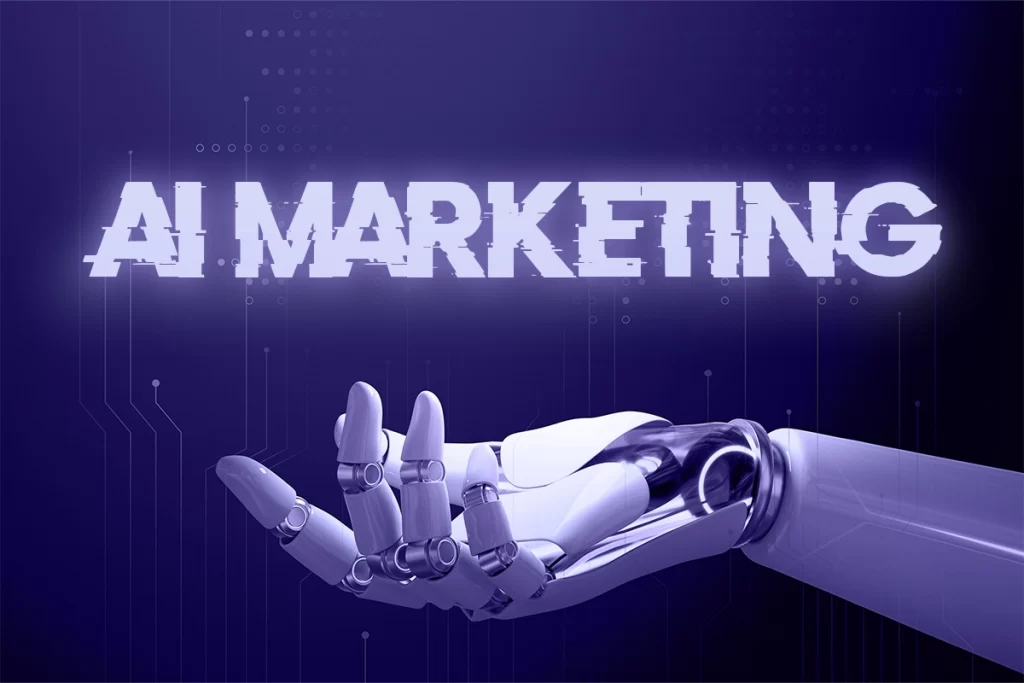Technology has an impact on almost every sector, and marketing is no exception. Equally trending is the concept of artificial intelligence (AI) marketing process. Thanks to Alexa and Siri, which are based on sophisticated machine learning technology, we have begun to experience the benefits of artificial intelligence at home and in the workplace. Do these kinds of tools not make you curious about the possibilities for marketing with AI? It could cause a seismic shift in how advertising and consumption are conducted in the years to come.
Almost every marketer is discussing and pondering how artificial intelligence may affect their work, as the current trajectory of technological progress favours AI. While it’s true that AI is still in its infancy and we haven’t arrived quite yet, it’s also true that it will only continue to improve. Not only do we need to understand how AI, machine learning, and advanced analytics technologies are transforming marketing, but also how we should adapt to these new possibilities.
What is AI in Marketing?
Artificial intelligence is widely utilised in the fast-paced world of digital marketing. Many modern digital marketers use AI either to supplement their existing marketing teams or to carry out more tactical activities that call for less human finesse. Artificial intelligence (AI) enables marketers to automatically send timely, personalised communications to customers based on their individual preferences and the results of extensive data collection and analysis about their campaigns and the audiences they aim to reach.
With the help of AI methodologies and tools like data models, algorithms, and machine learning, marketers may gain customer insights that help them cut costs, create more relevant content, and provide a more individualised experience for their target audience.
Chatbots, picture recognition, personal assistants (like Google Assistant, Amazon Alexa, Microsoft’s Cortana, and Apple’s Siri), recommendation engines, search-based targeted advertising, and dynamic pricing on ecommerce sites are all examples of AI marketing solutions.
Ways AI Will Change the Future of Marketing in 2023
Some people are still lagging behind the rest when it comes to understanding the genius of AI, but it has already revolutionised the future of marketing. Here are some ways AI is opening the door to an inclusive digital marketing experience that benefits everyone:
Turns to Automate Marketing:
AI may be disruptive, but it’s also still learning and getting better. In fact, it will not only surpass human intelligence but even replace it. Your AI assistant, such as Amazon Echo or Apple’s Siri, will promote you and your company so you don’t have to. You are not limited to merely communicating with and reading voice-activated messages from your device. Your AI will develop greater independence as time goes on. Your device will suggest the best options for everything from shopping to booking flight
Automated Content Creation:
AI has revolutionised content creation for marketers since OpenAI released ChatGPT. AI algorithms assess customer data, current themes, and other pertinent information to generate engaging content. Automation of content development helps businesses save time and money, and AI-generated content can be adapted for use across multiple channels and demographics. By 2024, AI-generated content will make up 30% of all content produced by businesses, according to a study by Gartner.
The Rise of Hyper-Targeted Marketing
AI has the capacity to analyse data and craft unique user experiences, allowing businesses to send ads that resonate. A study showed that the ‘open rate’ for customised emails was 29% higher and the ‘click-through rate’ was 41% higher than for generic emails. In 2023 and beyond, AI will make advertising even more effective by finding untapped channels and improving targeting, budgeting, and ad delivery. Experts in advertising can use the data provided by AI to create highly effective campaigns that appeal to their target demographic.
Human like Chatbots
One of the most well-known applications of artificial intelligence in commercial contexts is chatbots. Chatbots are used by marketers in many different channels, including websites, social media messengers, emails, and live chat support. When customer support agents are unavailable or when a large volume of standard inquiries need to be handled, these tools can help bridge the communication gap. Marketers can gain useful information and a deeper familiarity with their target audience thanks to AI chatbots, which collect analytics to forecast customer behaviour and guide conversations with clients. It aids in providing hyper-personalized content that responds to consumers’ search queries and boosts repeat business.
Improvements to Voice Search Performance
This is yet another example of how AI is influencing the near future of online advertising. Even if you don’t train your voice, tech giants like Google, Amazon, Facebook, and Apple can still recognize it. Artificial intelligence leverages these IT infrastructures to improve your experience. More and more people are turning to voice assistants like Siri, Alexa, and Google Assistant to find the answers to their questions, so it’s crucial that content be optimized for voice search. Marketers may communicate with customers through this new medium by using natural language processing powered by artificial intelligence to craft messages.
Targeting on Social Media has been Improved
Marketers can now evaluate client data and launch tailored advertising on social media thanks to AI-powered social media targeting. Marketers may increase engagement and conversions by catering their content to their target audience’s tastes, interests, and habits. Social media scheduling and publishing can be automated with the help of AI, saving valuable time and manpower for marketing departments.
Augmented Reality and Virtual Reality
Augmented and virtual reality have skyrocketed because to AI. Augmented reality lets marketers blend real and virtual worlds. These technologies let customers “try on” and customise their purchases. Online apparel shoppers can test on different colours. A car shopper might take a virtual test drive. AR marketing gives customers a more personalised experience, something online shopping has lacked. According to Deloitte, 88% of medium-sized companies use or test AR. AR/VR technologies boost client contact and make shopping more fun and cutting-edge.
Analytics for the Future
Using client data, AI-powered predictive analytics can predict future trends, recognise patterns, and make evidence-based judgements. McKinsey found that organisations who employ predictive analytics are more than twice as likely to be in the top financial performance quartile within their industry. Professionals may maximise the benefits of predictive analytics by using AI tools. AI is also being considered by marketers to better understand the market and devise tactics to beat the competition. In order to better serve their customers and increase their ROI, marketers are increasingly turning to AI algorithms to help them find new insights and consolidate their data.
Increased Emphasis on Customer Experience & Emotional sentiments
Chatbots enabled by artificial intelligence (AI) can interpret customers’ questions and provide timely responses, 24 hours a day, seven days a week. Artificial intelligence (AI)-created quizzes and surveys are another excellent method of encouraging consumer participation and enhancing the overall service. Existing services are improved based on the data collected by these tools.
By examining customer feedback and online mentions with AI-powered sentiment analysis, marketers can gain a better understanding of how their target audience feels about their brand and products. Using this information, marketers may better understand customers’ dissatisfaction with present products and services. The use of AI to monitor social media in real time can also be put to use in responding to customer compliments and concerns.
Conclusion:
AI and machine learning are altering marketing. Marketers must see this technology beyond data analytics. It’s time to focus on consumer requirements rather than technology innovation.
If you invest in AI, make it purpose-driven, value-creating, and customer-driven. Marketers investing in AI must first comprehend its great potential. Then they may modify marketing and establish consumer trust in this technology.
Many firms are using AI technologies to boost efficiency, personalise customer experiences, and stay ahead of the competition in digital marketing.
Contact an AI-focused digital marketing agency to explore how AI may help your business. Contact Cuneiform Consulting to assess your business’s AI marketing potential and create a killer digital strategy.




